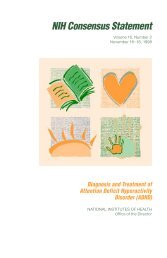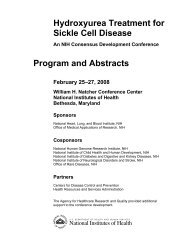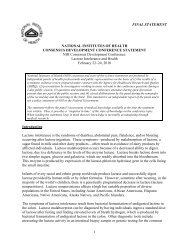In order to effectively counsel individuals with CD, physicians and dietitians mustunderstand the emotional and psychological impact of the disease and diet, as well as thecomplex quality-of-life issues patients and their families face on a daily basis, and offer practicaladvice and specific strategies to help them successfully follow the GFD. (5,14)Poorly Controlled/Nonresponsive <strong>Celiac</strong> <strong>Disease</strong>It is critical to conduct a systematic review of nonresponsive CD, as several factors maybe responsible for poor control, such as intentional and/or unintentional gluten ingestion andco-existing gastrointestinal conditions (e.g., lactose intolerance, bacterial overgrowth,microscopic colitis, collagenous colitis, enteropathy-associated T-cell lymphoma and refractorysprue). (1,3,7,20) The most common cause of nonresponsive CD is gluten ingestion, either intentionalor unintentional. (1,4,7,13) Therefore, it is essential that the patient have ongoing followup andeducation with a dietitian experienced in CD. Better dietary compliance can reduce the risk offurther complications and associated health care costs.Sources and Quality of InformationPatients seek information on CD and the GFD from a variety of sources including healthprofessionals, celiac support groups, health food stores, alternative health practitioners, theInternet, libraries, dietetic associations, food companies, and the media. Unfortunately, patientsfrequently receive outdated, inaccurate, and/or conflicting information from some of thesesources, resulting in patients unnecessarily restricting certain foods and thus limiting the varietyand nutritional quality of their diet. Several studies have reported on the perceived quality ofinformation that patients receive from different sources. (5,8,12,14,19) The majority of adults surveyedreported a high level of confidence in the information provided by celiac support groups;however, gastroenterologists, dietitians, and family physicians received significantly lowerratings.Access to InformationAs MNT is the only treatment for CD, it is essential that newly diagnosed patients bereferred to a dietitian. Case (2004 unpublished) conducted an online and/or telephone survey of96 dietitians in the United States and Canada to ascertain referral procedures and practices.Although CD is considered to be a high priority by the majority of the dietitians, with patientsbeing seen within 1–2 weeks of referral in both the United States and Canada, many patients arenot always referred to a dietitian for MNT. Another major concern in the United States is thelimited or lack of reimbursement for MNT by insurance companies. Most patients must pay forthe service, which can range from $60–$295/hour with an average rate of $92/hour. Somepatients are unwilling or unable to afford the counseling and are seeking alternative sources ofinformation and education.ResourcesThere are numerous resources available to patients and health professionals from a widevariety of sources such as celiac support groups (<strong>Celiac</strong> <strong>Disease</strong> Foundation, Gluten Intolerance99
Group, <strong>Celiac</strong> Sprue Association, Canadian <strong>Celiac</strong> Association); self-help books (Danna Korn,Shelley Case, Tricia Thompson, Nancy Patin Falini, Bonnie Kruszka, LynnRae Ries); cookbooks(Bette Hagman, Carol Fenster, Connie Sarros, Karen Robertson, Donna Washburn, RebeccaReilly, Roben Ryberg, Sheri Sanderson); and magazines (Gluten-Free Living, Living Without).RecommendationsAdditional training on CD and its dietary treatment at the undergraduate,internship/residency, and practicing levels for dietitians, physicians, nurses, and other alliedhealth professionals is essential. Dietetic and medical associations need to establish specificMNT protocols for CD and offer CPE programs at national and regional conferences, as well aspractical online and print resources. It is important that dietitian consultations providing MNTfor CD be covered by insurance for initial and followup nutrition management. Enhanced andmore comprehensive food labeling regulations are necessary so that patients can make informeddecisions when purchasing foods. Greater cooperation and collaboration among celiac supportgroups is required to ensure that consistent, evidence-based information is being disseminated topatients, health professionals, the media, and others, as well as a strong, unified voice whenlobbying Government for enhanced labeling regulations and MNT coverage for CDmanagement. The food industry needs further education and training for staff about CD and theGFD.References1. Abdulkarim A, Burgart L, See J, Murray J. Etiology of nonresponsive celiac disease: resultsof a systematic approach. Am J Gastroenterol. 2002;97:2016–2021.2. American Gastroenterological Association medical position statement: celiac sprue.Gastroenterology. 2001;120:1522–1525.3. Ciacci C, Cirillo M, Cavallaro R, Mazzacca G. Long-term follow-up of celiac adults ongluten-free diet: prevalence and correlates of intestinal damage. Digestion. 2002;66:178–185.4. Ciacci C, D’Agate C, De Rosa A, et al. Self-rated quality of life in celiac disease. Dig DisSci. 2003;48:2216–2220.5. Cranney A, Zarkadas M, Graham, I, Switzer C. The Canadian celiac health survey—theOttawa chapter pilot. BMC Gastroenterol. 2003;3:8.6. Fera T. Affective disorders and quality of life in adult coeliac disease patients on agluten-free diet. Eur J Gastroenterol Hep. 2003;15:1287–1293.7. Green P, Jabri B. Coeliac disease. Lancet. 2003;362:383–391.8. Green P, Stavropoulos S, Panagi S, Goldstein S, et al. Characteristics of adult celiac diseasein the USA: results of a national survey. Am J Gastroenterol. 2001;96:126–131.100
- Page 1 and 2:
NIH Consensus Development Conferenc
- Page 3 and 4:
III. What Are the Manifestations an
- Page 5 and 6:
• What is the management of celia
- Page 7 and 8:
Monday, June 28, 2004 (continued)I.
- Page 9 and 10:
Monday, June 28, 2004 (continued)II
- Page 11 and 12:
Wednesday, June 30, 2004 (continued
- Page 13 and 14:
Lisa H. RichardsonConsumer Represen
- Page 15 and 16:
Ciaran P. Kelly, M.D.Director, Celi
- Page 17 and 18:
Van S. Hubbard, M.D., Ph.D.Director
- Page 19 and 20:
AbstractsThe following are abstract
- Page 21 and 22:
susceptibility (e.g., DR17 homozygo
- Page 23 and 24:
The Pathology of Celiac DiseaseDavi
- Page 25 and 26:
In this regard, the transport pathw
- Page 27 and 28:
for the IgG-based test, while speci
- Page 29 and 30:
15. de Lecea A, Ribes-Koninckx C, P
- Page 31 and 32:
Clinical Algorithm in Celiac Diseas
- Page 33 and 34:
Considera diagnosisof celiac diseas
- Page 35 and 36:
There are populations at particular
- Page 37 and 38: Serological Testing for Celiac Dise
- Page 39 and 40: Estimates of the sensitivity of the
- Page 41 and 42: the risk and severity of CD may als
- Page 43 and 44: What Are the Prevalence and Inciden
- Page 45 and 46: ascribed to excess menstrual loss.
- Page 47 and 48: ReferencesFamily History of Celiac
- Page 49 and 50: Carroccio A, Iannitto E, Cavataio F
- Page 51 and 52: identified by surveys or through so
- Page 53 and 54: Clinical Presentation of Celiac Dis
- Page 55 and 56: een widely reported. The question r
- Page 57 and 58: The Many Faces of Celiac Disease: C
- Page 59 and 60: References1. Green PH, Jabri B. Coe
- Page 61 and 62: Association of Celiac Disease and G
- Page 63 and 64: Does the Gluten-Free Diet Protect F
- Page 65 and 66: Skin Manifestations of Celiac Disea
- Page 67 and 68: allow a better understanding of the
- Page 69 and 70: 4. Henriksson KG, Hallert C, Walan
- Page 71 and 72: characterized, clinically-identifie
- Page 73 and 74: 10. Hoffenberg EJ, Emery LM, Barrig
- Page 75 and 76: ataxia, epilepsy with posterior cer
- Page 77 and 78: Consequences of Testing for Celiac
- Page 79 and 80: Osteoporosis/FracturesThere were 11
- Page 81 and 82: Dietary Guidelines for Celiac Disea
- Page 85 and 86: 21. Thompson T. Thiamin, riboflavin
- Page 90 and 91: 9. Hallert C, Granno C, Hulten S, M
- Page 92 and 93: adhered to the GFD after more than
- Page 94 and 95: Patient education, close supervisio
- Page 96: 26. Mustalahti K, Lohiniemi S, Laip







